A Look Back with Hope for the Future
“A Look Back with Hope for the Future” by Rod Starling
Article contributed by Rod Starling
It is never a pleasant thing to have to emphasize negative aspects of any matter but it seems to fall to me by compulsion to undertake the task. Hopefully, I may be able to include or end this article on some positive note.
Playing cards are my passion and they have been a part of my psyche since childhood when my grandmother taught me how to play simple solitaire. The cards, particularly the picture cards, resonated with me. They seemed to step out of fairy tales of long-ago times. The colorful garments and the suit symbols themselves were mystifying. At a very early age I became enthralled with magic card tricks the study of which brought the cards into sharp focus. I began to wonder just how cards were developed and by who.
Early on, two events sparked my interest in collecting cards. First, I came across the excellent Fireside Book of Playing Cards edited by Oswald Jacoby and Albert Morehead and published by Simon & Schuster in 1957. The end papers in that book alone, which I am showing, were enough to hook me. They pictured a selection of very unusual and colorful cards that sent my imagination soaring. I had never seen such cards and wondered if it was ever going to be possible to find any of them. In particular, the book introduced me to the Tarot.
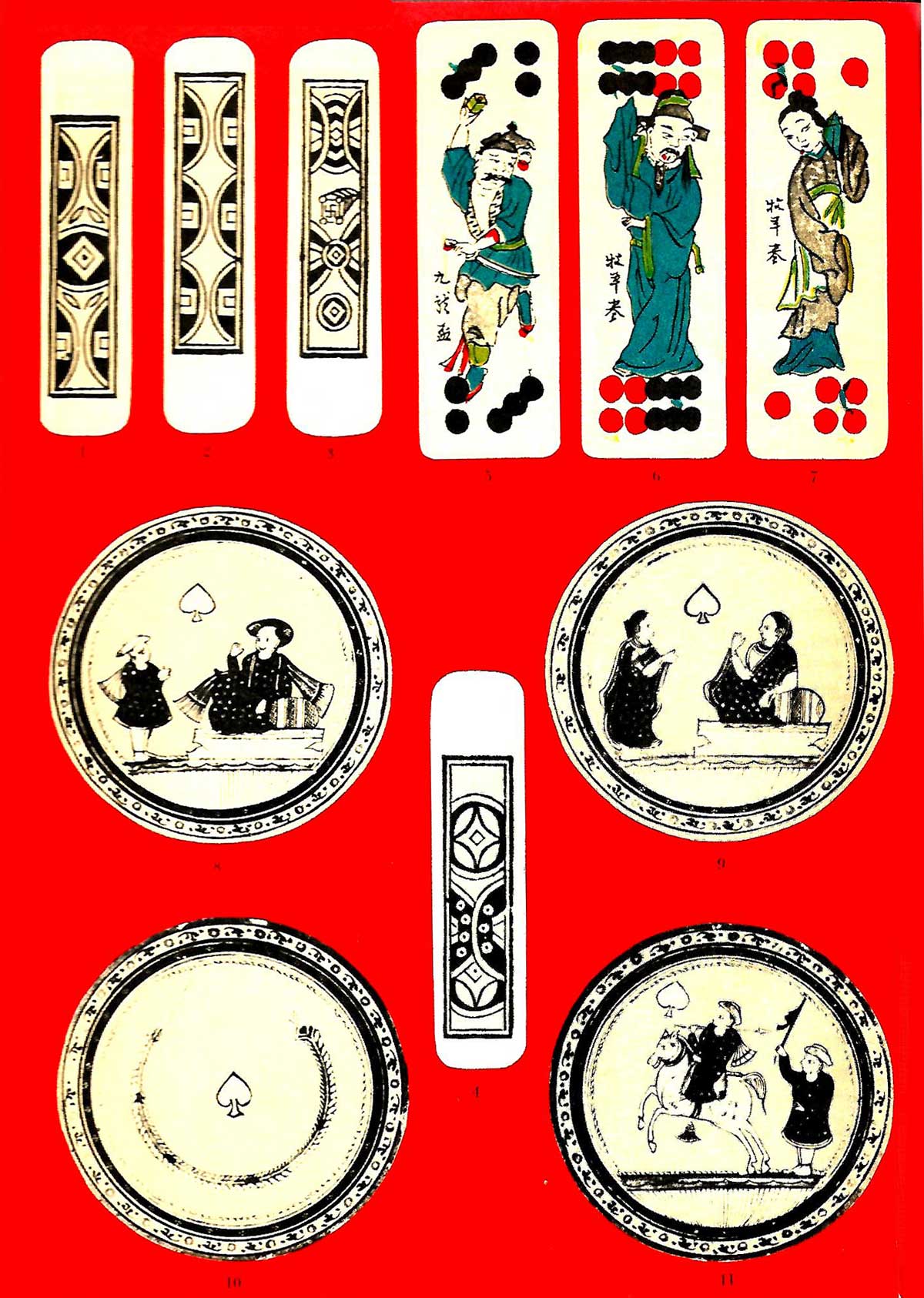
Above: endpaper #1 from Fireside Book of Playing Cards edited by Oswald Jacoby and Albert Morehead, published by Simon & Schuster in 1957.
The second seminal event involved my casually looking in the window of a store whose business was interior decorating with an emphasis on wall decorations. The window display consisted simply of a small, round marble top table upon which rested what appeared to me to be a pack of cards. However, they were larger than usual and square cornered. The only card that I could see pictured a medieval looking character with an acorn pictured in the corner of the card. Knowing nothing at the time as to what I was looking at, I nevertheless felt that it was something old, different and interesting. In fact, as I later came to understand, the cards were German with the traditional German suits of Acorns, leaves, Bells and Hearts. I ventured into the store and inquired of the owner as to whether the cards were for sale, not that I had any money, by the way. The owner informed me that he framed such cards for wall decorations and that they were not for sale.
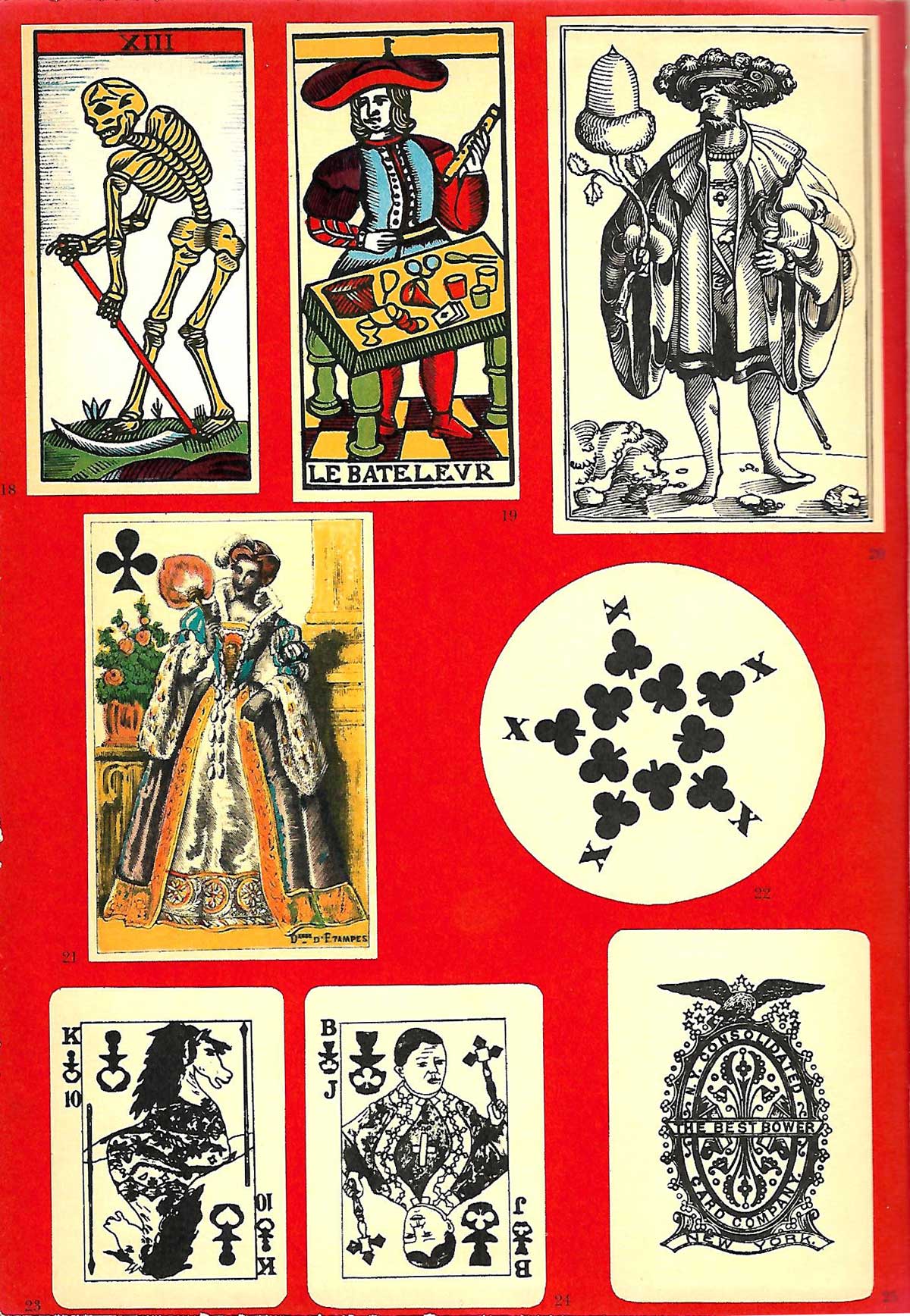
Above: endpaper #3 from Fireside Book of Playing Cards edited by Oswald Jacoby and Albert Morehead.
At the time, I was living in New York City which is a marvelous place to find just about anything (if you can afford it) and as a young guy I used to roam about the city from end to end. In short order, I obtained two tarot decks in the Greenwich Village district of the City. One day my travels took me along fashionable Fifth Avenue where I chanced once again to find myself looking in the window of Black, Starr & Gorham, a high-class jewelry store on a par with Tiffany and Cartier. The window displayed a collection of jewelry pieces and some loose precious stones scattered among some very beautiful playing cards, again the likes of which I had never seen before. This time, I had ten dollars in my pocket and ventured into the store to see if the cards were available. Picture the scene. There I was in worn out sneakers, torn dungarees and a shabby shirt. Upon entering the store I was immediately accosted by a steely eyed security guard who no doubt was of a mind to escort me out the door. However, when I told him my purpose, he directed to the stationery department on the second floor where I was attended to by a most gracious sales lady. It turned out that the deck of cards in question was the French Le Florentin deck issued in a limited edition of 12,000 numbered copies. A single deck cost seven dollars and fifty cents which I gladly parted with and took the deck home.
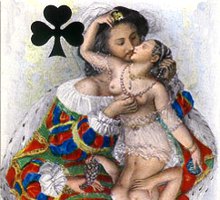
Above: ‘Le Florentin’ luxury deck with miniature paintings by Paul-Émile Bécat, published by Éditions Philibert, Paris 1956.
The Le Florentin deck is a wonderful piece of art. It has been offered on eBay countless times over the past few years and its sales record is a little sad. In the early 1980s, the deck sold for as much as two hundred dollars and considering its beauty and historical provenance, I think that it was well worth it to a serious collector. Unfortunately, it may be that every collector who wanted a copy of the deck eventually obtained it and that there are not 12,000 serious card collectors in the world necessary to exhaust the supply. I have recently seen copies of the deck offered on eBay for as little as forty-five dollars with no bidders! That could be the result of there being more decks than there are collectors but somehow I doubt it. I am afraid that the taste for historically significant decks does not appeal to today’s collectors, at least not to the newer ones. Rather, they prefer the newest issued decks with totally new designs such as have been floated by Kick Starter projects. Of course, we all know that there is no accounting for taste and a person may collect whatever appeals to him, particularly when the new decks are so much less expensive than true vintage decks. To my mind, however, I doubt that decks such as a Bicycle Zombies or Bicycle Freak Show will ever become the prized collectables as are the original Bicycle issues or the original issues of any of the early decks by Dougherty, Lawrence & Cohen, Samuel Hart and the many other makers who created such fine cards during the late nineteenth and early twentieth centuries. I wonder if any of today’s collectors would care at all about owning a nineteenth century illuminated deck such as was produced by each of the three makers just mentioned in the nineteenth century.
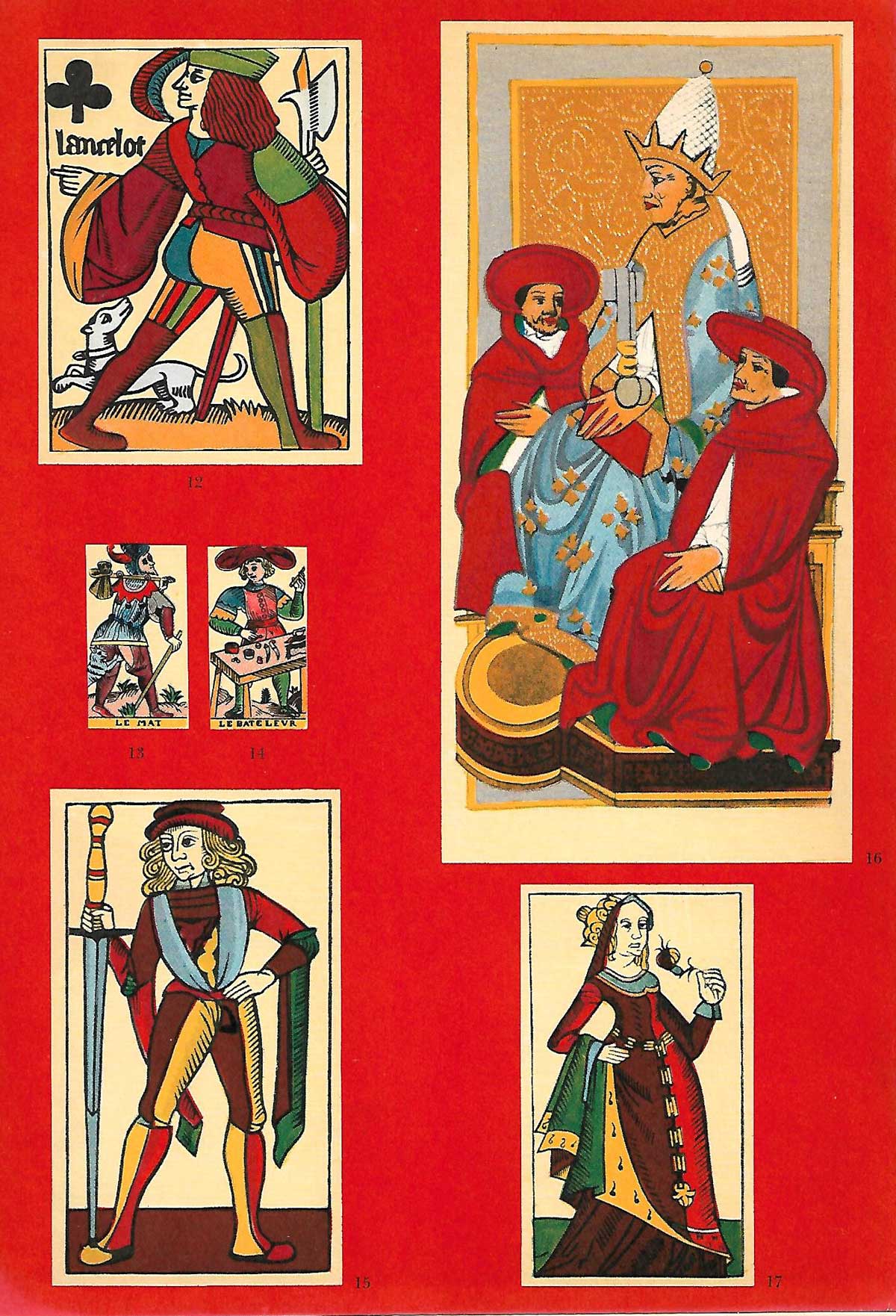
Above: endpaper #2 from Fireside Book of Playing Cards edited by Oswald Jacoby and Albert Morehead.
I have tried by way of the many articles that I have written as well as a book, "The Art and Pleasures of Playing Cards", to inspire and keep alive the historical interest in the old cards and have hoped that younger collectors will eventually experience the maturity of taste that will lead them to what I think will be a fuller and more enjoyable appreciation of the entire field of playing cards.
As I implied at the beginning, the present state of affairs with respect to card collecting generally is troubling but I will continue to try to keep hope alive. In that regard, I would like once again to highly recommend the excellent website of the World of Playing Cards at www.wopc.co.uk It is an absolutely amazing site which is administered by Simon Wintle and his son who have in fact created a living encyclopedia of playing card knowledge. I am honored by having been invited to post several decks from my collection on the site. Everyone who aspires to the field of playing card collecting should take full advantage of the wealth of knowledge in both text and pictures that the site provides. It is truly outstanding.
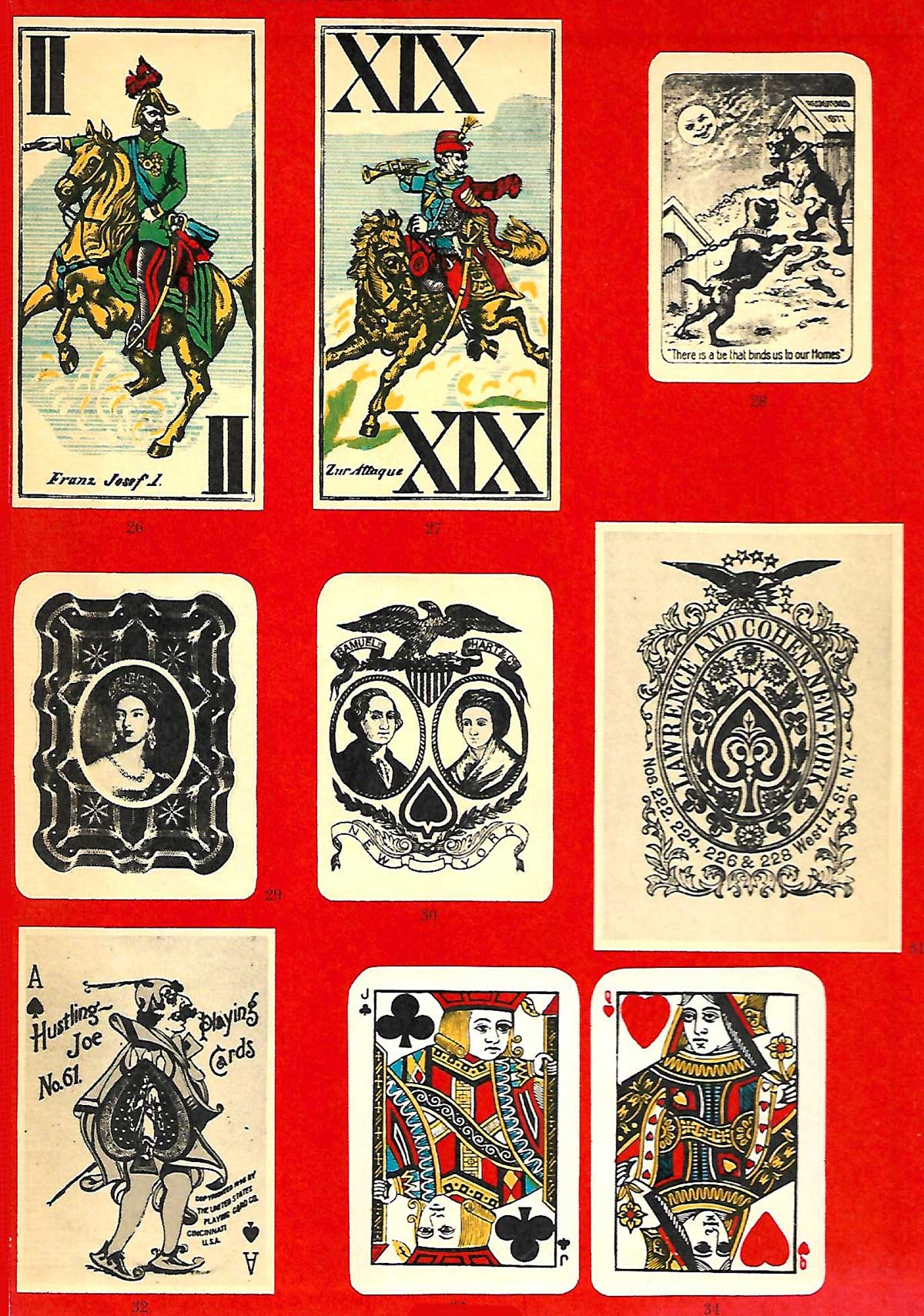
Above: endpaper #4 from Fireside Book of Playing Cards edited by Oswald Jacoby and Albert Morehead, published by Simon & Schuster in 1957.
© Rod Starling, December 2018.

By Rod Starling (1936-2023)
Member since January 09, 2013
Rod Starling was one of the founding members of the 52 Plus Joker card collectors club. He authored many articles for the club's quarterly newsletter, Clear the Decks. His collection encompasses both foreign and American decks. Rod also authored a book titled The Art and Pleasures of Playing Cards.
Related Articles

Rap Rummy
Rap Rummy made by Parker Brothers in 1926, only 4 years after the discovery of King Tutankhamen’s to...

German Travel Cards
A travel-themed educational deck helping American tourists visiting Germany.

Can You Believe Your Eyes?
“Can You Believe Your Eyes?” playing cards featuring visual illusions & other oddities.

Get Decked
Black and white cartoons devised by Sam Wagner with help from artist Lindsay Bevington.

Beowulf
Jackson Robinson's Beowulf playing card deck inspired by the Old English pagan poem.

Keith Haring playing cards
Energetic graffiti images by the American artist Keith Haring.

The Tarot of Meditation – Yeager Tarot
Marty Yeager’s original Tarot of Meditation from 1975, republished later by U.S. Games Systems, Inc....

Adobe Deck
The first digitally-produced deck of cards.

Seminole Wars deck
Seminole Wars deck by J. Y. Humphreys, Philadelphia, c.1819.

The UCR Deck
Giant-size cards designed by Thomas Sanders to advertise courses and facilities at UCR.

Fredericks & Mae playing cards
A rainbow pack from the design team of Fredericks & Mae and Benjamin English.

Red Hat Society playing cards
Society that encourages women in their quest to get the most out of life.

Mountain Dream Tarot
Groundbreaking Tarot created by Bea Nettles, using photographs and photo montage.

Junior Playing Cards
Child-friendly versions of standard English pattern cards designed by Louie Mantia, Jr.

Last Call Cats playing cards
Bar-crawling cats, designed by artists Arna Miller and Ravi Zupa.

Covered bridges playing cards
Historical covered bridges with photography by Bill Miller, 2006.
Most Popular
Our top articles from the past 28 days

